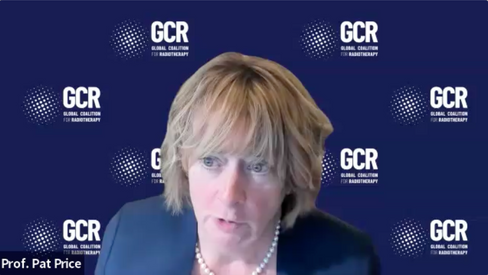NIH & GCR Working towards access to high-quality medical imaging & radiotherapy
- Shilo Ramirez
- Jun 9, 2024
- 4 min read
Updated: Jun 13, 2024
The National Institutes of Health (NIH), along with the Global Coalition for Radiotherapy (GCR) have proposed a collaborative project to establish essential standards for effective cancer care development. This initiative aims to bring together diverse stakeholders to ensure a holistic approach to cancer treatment.
To create a tangible impact on cancer treatment and pave the way for improved healthcare outcomes worldwide, the project will focus on the following key components:
Comprehensive stakeholder engagement
Real-time metrics and data evaluation
Collaboration across health domains
Global recognition and financial support
This collaboration was first announced during World Cancer Day, and as a follow up to that announcement, GCR hosted a webinar to discuss this project and open up a discussion about medical imaging and radiotherapy.
Professor Pat Price, GCR Chair of the board, shared information about GCR and the development of the RT Essential Standards, which were acknowledged in a recent article from The Lancet Oncology. She spoke about next steps in the project, including the implementation of the NIH collaboration.
The Implementation Science Initiative
Dr. Ted Trimble, NIH expressed his delight in moving forward with the initiative to provide access to medical imaging and radiation therapy globally.
“So the goal of this effort is to how do we ensure that people around the world, not necessarily those with cancer, those without cancer, get the best possible medical imaging for the cancer patients, the best possible radiation, the best possible chemotherapy.”
Trimble invited Professor Hedvig Hricak and Professor Andrew Scott to share their expertise.
Hricak highlighted the impact of proper imaging on patient outcomes and the significant return on investment, stressing the essential role of imaging in radiation therapy precision. She discussed the need to include other medical disciplines, such as pathology.
“Cancer care is continuum care. We are one team, and if we don't have some members of our team, the care suffers.”
Scott discussed the data showing the potential to save lives through improved imaging access and engagement with organizations like the International Atomic Energy Agency (IAEA) and the World Health Organization (WHO). He also mentioned the importance of application to other areas:
“Medical imaging and nuclear medicine, which was the subject of our Lancet Oncology commission- obviously has implications far beyond just cancer... Once you've got the equipment, once you've got the infrastructure, once you have the workforce that's trained, it can apply in a number of other areas. So as part of our proposal for World Health assembly resolution, we are proposing imaging not just in cancer, but also in neurological disorders, cardiac disorders, infectious disease, and so on.”
Webinar Key Takeaways
Some of the insights gained from the meeting were suggestions that we could involve pathologists and data/tech companies. Additionally, we need to improve the patient journey, and engage with the group on the call and their extended networks to maximize the benefits of our collaboration.
World Health Assembly
As a follow up to the virtual meeting, in partnership with GCR, the Women’s Health and Economic Empowerment Network (WHEN), the U.S. National Cancer Institute (NCI), and the Harvard Medical School’s Program in Global Surgery and Social Change (PGSSC) hosted a roundtable at the World Health Assembly (WHA) in Geneva, aimed at addressing persistent gaps in medical diagnostics access in emerging markets. The session served to establish a strategic working group of global leaders from G20 governments, investment firms, the private sector, philanthropists and DFIs who will work collaboratively to structure financial vehicles for women’s health, with a focus on medical diagnostics

Participants worked to structure a financing plan through which key stakeholders will jointly leverage capital to strengthen medical systems and unlock further financial commitments. Additional emphasis was put on the importance of de-siloing investments to build resilient ecosystems that are conducive to lasting change and financial sustainability. Priority investment areas were identified, including training healthcare workers, renewable energy, the use of AI and digital platforms, local manufacturing, and equipment maintenance and servicing.
During the meeting, His Excellency Budi Gunadi Sadikin, Indonesia’s Minister of Health, highlighted the national health care and medical diagnostics needs, particularly regarding prevention, screening, diagnostics, and treatment for women’s cancers and maternal health. WHEN has been working in partnership with his Excellency, Minister Sadikin and the Ministry of Health in designing and deploying a Special Purpose Vehicle (SPV) into Indonesia to address these needs and bring equitable health access to the last mile. Under the suggestion of Professor Price, radiotherapy was highlighted as a vital solution to be enhanced and scaled.
As next steps, participants will reconvene for workshops in the following months, during which they will finalize the structuring of financial vehicles for medical diagnostics in emerging markets. The first follow up session is planned for the end of June 2024.
Acknowledgments
We would like to extend our gratitude to everyone who participated in the meetings, sharing their expertise and input. We look forward to seeing you at future events, and participating in future meetings. We will inform the GCR community of the next virtual meeting.
REVIEW THE RECORDING
You can watch a recording of the virtual meeting here:
REVIEW THE SLIDE DECK FROM THE PRESENTATION
The slide deck from the virtual meeting can be downloaded here:









Comments